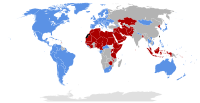
Photo from wikipedia
The current study examined how ingroup and outgroup Theory of Mind (ToM) predicts children’s and adolescents’ reasoning for their acceptability judgments of intergroup bullying of Syrian refugee peers and group… Click to show full abstract
The current study examined how ingroup and outgroup Theory of Mind (ToM) predicts children’s and adolescents’ reasoning for their acceptability judgments of intergroup bullying of Syrian refugee peers and group support of intergroup bullying. Participants included 587 Turkish middle (n = 372, Mage = 12.19, SD = 1.01; 208 girls) and high school (n = 215, Mage = 14.81, SD = 0.97; 142 girls) students. Participants read a bias-based bullying story with a Syrian refugee peer targeted by an ingroup Turkish peer. Then, participants rated the acceptability of bullying and group support of bullying and were presented with a reasoning question (Why?) after each acceptability question (bullying and group support of bullying). Reasoning codes included Fairness, Refugee Status/War, Prejudice and Discrimination, Harm, Prescriptive Norms, Group Functioning, and Relationship with the Bully. Participants’ ingroup and outgroup ToM abilities (measured using the Strange Stories) were evaluated as predictors of reasoning. Results documented that middle school students were more likely to attribute mental states to their ingroup members compared to outgroup members while high school students’ ToM performance did not differ across contexts. Further, the more unacceptable participants judged bullying to be, the more they reasoned about the bullying by referencing fairness, refugee status, discrimination, and harm. Results also documented that ingroup and outgroup ToM were positively related to attribution to fairness and participants’ usage of multiple reasoning judgments while only outgroup ToM was a significant predictor of reasoning around refugee status/war, discrimination, and prejudice. The findings provide implications for intervention programs that tackle intergroup bullying by examining bystanders’ social cognitive skills in a specific context.
Journal Title: Frontiers in Psychology
Year Published: 2022
Link to full text (if available)
Share on Social Media: Sign Up to like & get
recommendations!